Kathy Valentine on life with The Go-Go’s: ‘My addiction stopped me feeling like a sad mess’
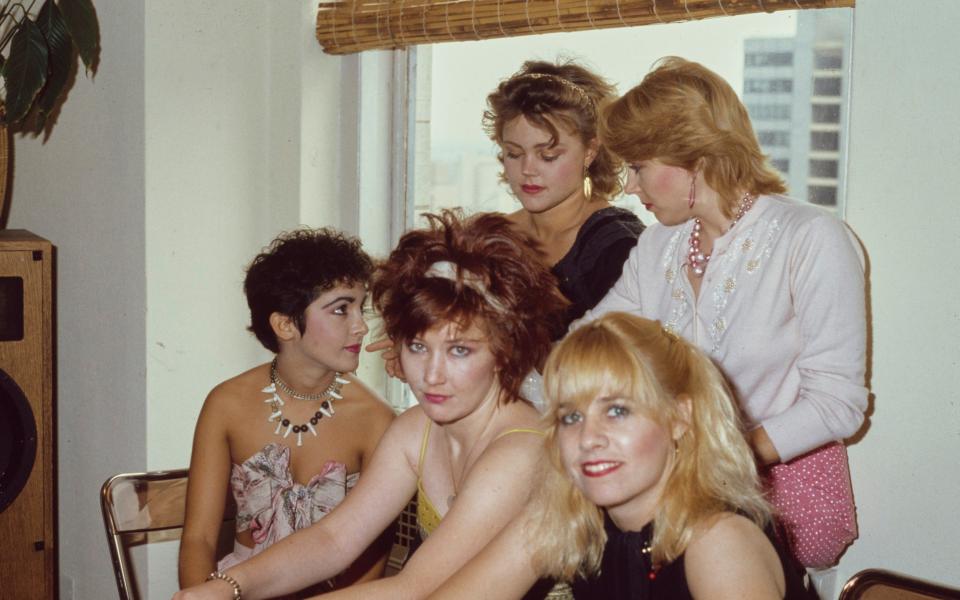
It’s New Year’s Eve, 1980, and Kathy Valentine is on stage and on a high. “We were five girls barely into our 20s, propelling the crowd into near delirium with our music. People started throwing money on stage, and it just kept coming. Belinda scooped up a handful of bills and stuffed them in her bra... By midnight, the Whisky walls could barely contain the energy of the show... It felt like a rocket ship countdown, and I was ready to blast off.”
“The Whisky” is legendary Sunset Strip venue the Whisky a Go Go; “Belinda” is Belinda Carlisle, lead singer with The Go-Go’s, a fast-rising punk(ish) on the Los Angeles scene; and the narrator is the 21-year-old who’s making her debut as the five-piece’s new bass player.
Within months they would be one of the biggest bands in America, shot into the stratosphere by power-pop anthems We Got the Beat and Our Lips Are Sealed, the boost of a European tour supporting labelmates The Police and the visual brilliance of a group perfectly suited for the brand new phenomenon that was MTV.
Valentine is from Texas, but she wouldn’t have been on that LA stage that night four decades ago if it wasn’t for her English mother Margaret, a native of Stanmore on the northern outskirts of London. “I would have likely stepped into a different future if I hadn’t been in England in 1973 with my British mom, watching a music television show,” she says of Top of the Pops.
“I was 14 years old, and there she was: Suzi Quatro, a bass player fronting a rock band of guys. Seeing her doing what I had seen only men do changed everything. From that moment, I had one goal: to be in a kickass band with a gang of like-minded girls and claim the life I wanted for myself.” So writes Valentine in her autobiography All I Ever Wanted: A Rock ‘N’ Roll Memoir. It is a searingly vivid depiction of that rocket-ride experienced by The Go-Go’s in the music scene of the go-go-go early Eighties.
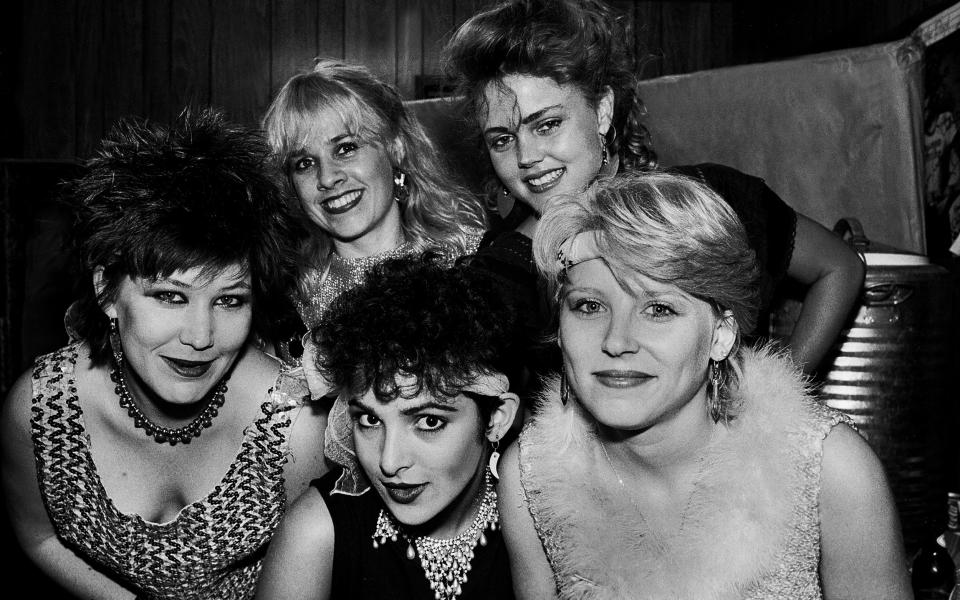
“First your dream is just to play your instrument,” this woman who’d spent her teens in and out of bands, first in Texas then in LA, explains to me. “So by the time you're in New York City, 22 years old, making [your debut] album with your best mates, it’s great. People are coming by the studio, you're recording all day, you're going out to the clubs at night, and people are just letting you in – ‘Oh, you’re The Go-Go's! Come in!’ That was a nine-week period of just concentrated wonderfulness.”
Other early highlights included a 1980 tour of the UK with The Specials. It was an experience which in part gifted The Go-Go’s Our Lips Are Sealed – the first track on debut album Beauty and the Beat (1981) and one of their cornerstone songs (35 million Spotify streams and counting) – and more besides.
“This was before I was in the band,” explains Valentine, who stood in on that New Year’s Eve 1980 show for the band’s regular bassist, who was sick, and then made such an impression that she never left. “But apparently, when the band went on tour with The Specials, there was all kinds of little flings happening.”
One interaction was between the former’s Terry Hall and Go-Go’s guitarist Jane Wiedlin. The Englishman ended up writing her a love letter. “The way I understood it, she had to give writing credit for the inspiration and I think some of the lines. But Jane wrote the song,” she claims, although Hall is indeed credited as co-writer. Two years later, in 1983, Hall released his own version, with his post-Specials band Fun Boy Three.
As well as being an evocative memoir, All I Ever Wanted is a provocative one, too. The author writes of the mire of drug and alcohol addiction that helped sink the band (for the first time) in 1985, not to mention the equilibrium-disturbing disputes over songwriting royalties.
Not that there was anything unusual in that regard. As Miles Copeland, boss of The Go-Go’s label, told me in an interview last year: “R.E.M. were the only group ever on I.R.S. to fulfil their entire contract... The Go-Go’s broke up on the third album, Fine Young Cannibals on the second, The Cramps thought I was the enemy... Every group had dramas, which was part of the fun of it. But R.E.M. were the dream.”
Those dramas simmer to this day, although not to the extent that the five women couldn’t reunite for a long overdue moment in the music establishment sunshine when they were inducted into America’s Rock and Roll Hall of Fame last year. Nor have they impeded the very active afterlife of The Go-Go’s, three-fifths of whom are now sober; the band are touring the UK this summer, supporting fellow MTV punk Billy Idol on a six-date arena tour.
But as recently as 2012, Valentine was an ex-Go-Go, the result of a sequence of events that involved her breaking her wrist, the band firing her and Valentine in turn suing the remaining members. It was “the culmination of years of dysfunction and toxic interpersonal relationships”. But the only reason she took legal action, she says, was that she had a nine-year-old daughter (Valentine is divorced).
“They made it so I wasn’t going to make any money,” says Valentine, a lively 63-year-old, with equable sangfroid as she video-calls from her home in Austin, the hometown she relocated back to from Los Angeles in 2006. “And this is a company that we had [together] – we’re a corporation, and you can’t do that. It’s basically against the law. I didn’t sue them because they kicked me out. I sued them because they took away something I built for 35 years.”
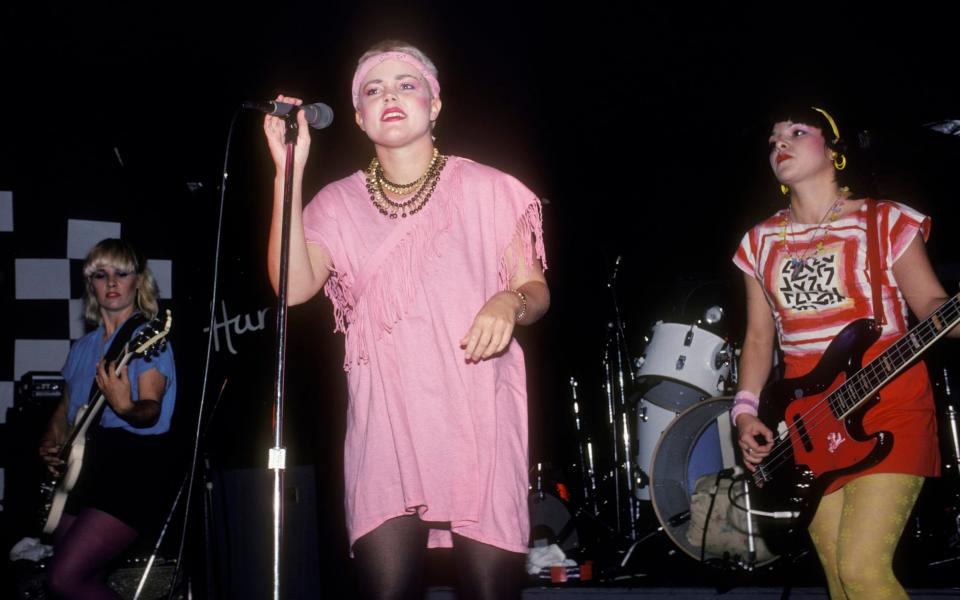
In the end, the rest of The Go-Go’s did three tours without her. “It was painful at the same time. I couldn’t watch. Fans would write me, thousands of fans, and say it wasn't the same.
“But I never disparaged any of [her bandmates]. And life went on. And yet, when I was asked back, it was a really, really good thing. Because I love being in the band. I like being in The Go-Gos. Who wouldn’t? I’m a musician. That’s what I do. I’m the only one in the band, except for Belinda, who has a huge solo career. But I’m the only one that will throw my amp in the back of the car and go play [in a] club.”
Nor does Valentine stint on excavating her personal difficulties. She’s now been sober for 33 years, but she isn’t looking for praise. As she puts with a laugh: “I drank enough that, if I had been drinking for all the past 33 years, it probably still wouldn’t fit into that time [in the band] when I was drinking!”
As well as gallons of booze, there were clouds of cocaine. In his rambunctious 2012 memoir, Rod Stewart writes that The Go-Go’s could “snort the lacquer off a table”. In All I Ever Wanted, in the chapter titled Let’s Have A Party (opening lines: “The Go-Go’s lived for fun. It was built into our band”), Valentine has her own take on those interactions.
Recalling an all-nighter with Stewart at the 1985 Rock in Rio festival in Brazil, she writes: “Rod had worked himself into a state, horrified to go perform his second headlining show. He had been up with us all night and day. I couldn’t believe he had never, in his entire career, stayed up on a binge before having to play.”
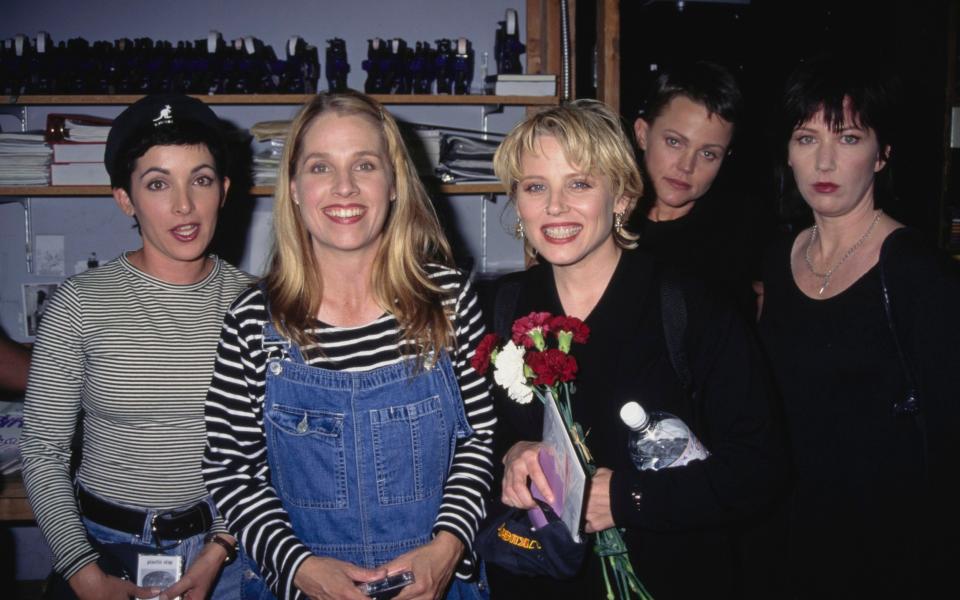
As for The Go-Go’s, “we were pretty high functioning,” she says to me now, “and I was high functioning. And very luckily, I didn't do so many of the terrible things that can happen. I wasn’t thrown in jail. I didn’t go crazy. I didn’t kill anybody or get in a car accident. I never became a terrible pill or heroin addict or things that are difficult to bounce back from.
“In terms of addiction, mine was serving a purpose. And it worked as long as it worked. And the purpose was to keep me from feeling like a sad mess.”
That feeling arose from a seriously wayward youth in suburban Texas, where Valentine was born to her English mother and US Air Force father (the couple met and married in London, but the relationship didn’t last long once they’d moved to America). Growing up, sex, drugs and booze entered young Kathy’s life before her teens did. She writes unsparingly about an abortion at 12 and rape at 14, two brutal aspects of the fall-out of a largely un-parented childhood in which her single mother left her to her own devices.
How difficult or daunting was digging into the darker episodes? “There were times where it was like just pulling it out,” she replies carefully. “I thought I could write about it with some separation. There were times that I did push away from the desk and just sob: ‘That did happen.’ But I also am very practical, and I have a really good sense of humour.”
Writing about the rape, which occurred during an adolescent girls’ road trip to Houston, was particularly “significant”, she says, “in that I’ve acknowledged for the first time… after how many years had gone by where I didn't ever call it rape. I just thought: what a stupid girl, to get yourself in a stupid mess.
“And after all, ultimately, I did say, ‘oh, just do it,’” she says, recounting the line her 14-year-old self says to the rapist in the book.
At the same time, Valentine – who’s Zooming in from a room with multiple guitars hanging on the wall behind her – explains how she wrote a soundtrack to accompany her book. “The idea was to try to capture the tone and the content in a lyrical, rhythmic, hopefully very enjoyable, listenable way. When I wrote the song for that chapter, as soon as I connected it musically, I started with the chorus: [sings] “Do it. Just do it. If I can’t stop you, I can let you.”
As she puts it, finding those lyrics “opened the grieving and the mourning. And it didn’t stop. I cried for three days.” Equally, though, lyrically, “that really busted it wide open. Just that little lyric saying, ‘if I can’t stop you, I can let you’ – that captured that part of me that at that time felt so powerless. Having that one little piece of power to go: OK, I’m going to let you. There was something about that that was the key.”

That makes sense, I say. But looking at the incident with the 14-year-old older brother of a friend, who took her virginity when she was 12 – that’s rape, too. “Mm, yeah,” replies Valentine, hesitantly. “It’s funny, I haven’t... But yeah – got me there, didn’t you?” she says, laughing. “But don’t let me go write a song about that one, because I’ll need time to grieve all over again.”
What does her daughter, who is now 19 and recently left for college, make of these revelations? “When she first overheard me talking about the book, it was about getting pregnant and having an abortion. She was 13 or 14, and she just said: ‘Why would you want anyone to know that? And that doesn’t happen – girls age do not get pregnant.’ And so we had to have a bit of a talk.”
Valentine explained the importance of telling her truth, of addressing “her adversity”, and of putting a positive narrative into the world. “It can be very helpful for people to see that you make big mistakes and can still be successful, and still be loved, and have good relationships, and still have the nice things of life.”
In the end, her daughter understood it, and also understood the context for the drug use and abuse depicted in the book, which was published in America in 2020. “I think her biggest concern was what the parents of her friends would think. And when the most religious, straight, conventional mom sent me a card saying, ‘I got your book and I think you’re so brave and honest and thank you for writing it and I loved reading your story,’ I think she was OK.”
As for her own mother, who’s now 84 and who “is still a big part of my life”, her take on the book was: “I thought I did a good job!” Valentine, to her endless credit, can laugh about that.
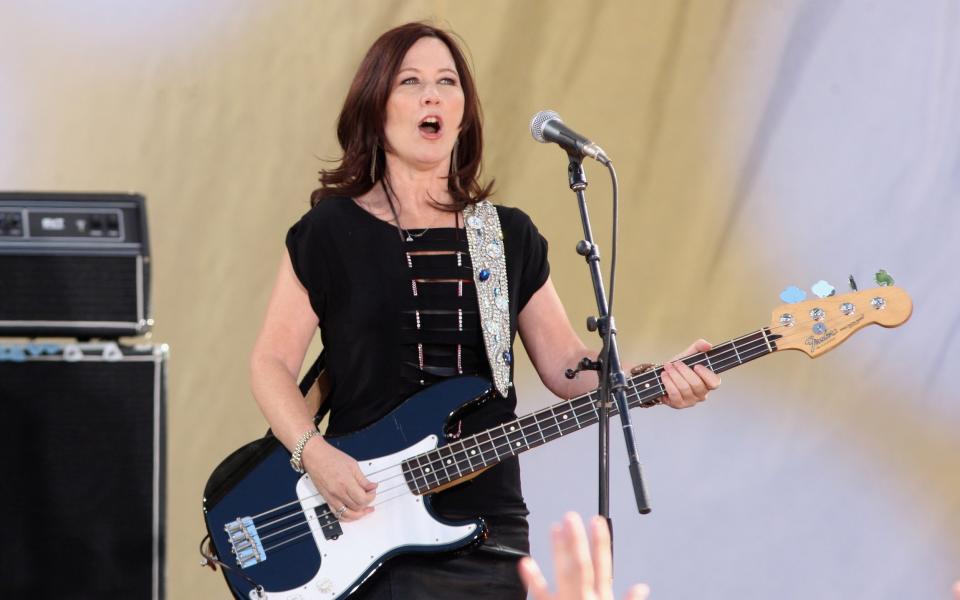
She says her bandmates – all of whom declined the opportunity to read it pre-publication – are also all OK with the contents, with drummer Gina Schock expressing shock at discovering exactly how chaotic Valentine’s pre-band life had been. And collectively they’re in a good place, albeit, it seems, headed for the exit door as a band.
“I know that we’re winding down. Both Belinda and Jane want to let it go and feel like the Rock Hall was the pinnacle. And we’re not creating new music. The truth is we have very, very different tastes in music. I don’t know how we would even agree on writing songs. But luckily, what we did was kind of classic and timeless. And there’s something magical about the band that that it still kind of works.”
Would Valentine say that, in the end, she got she ever wanted? “Yeah!” she says, beaming widely, adding as an aside that she’s considering moving to the UK in a couple of years, possibly to St Albans, where she has family. “And now I have new dreams. I’m applying for grad school. I want to do a collection of literary short stories. And I’m fine to go play in my band locally, and then come home and just be a writer and I have this dream. I'm 63 and I don't see why I shouldn’t have another new big dream.”
Does she view what The Go-Go’s did together as pioneering? “Absolutely. Just because of the visibility, you know? We didn’t have YouTube, we didn’t have the internet. The only women I saw in music either played piano or played acoustic guitars. It took me seeing Suzy to make me think differently. So I don’t know how many people saw The Go-Go's and went: oh, I can do that, too.’”
All I Ever Wanted: A Rock ‘N’ Roll Memoir (£14.95, Jawbone Press) is published on March 22 and available through Telegraph Books. The Go-Go’s play the UK with Billy Idol in June

